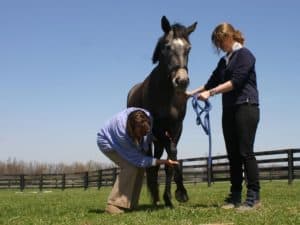Rotavirus in Foals: Quick Detection with Human Test
- Topics: Article
With a rapid test used to detect rotavirus in humans, veterinarians could diagnose rotavirus in foals more accurately and quickly and, thus, begin crucial treatment sooner. Researchers in Japan recently published a study comparing seven rapid antigen detection kits for diagnosing rotavirus infection in foals, and the Dipstick test commonly used in human medicine came out on top.
Rotavirus, a highly contagious virus that causes diarrhea, is commonly found in foals up to three months old. According to the American Association of Equine Practitioners, it can affect up to 50% of susceptible foals, generally those in the neonatal, perinatal, and suckling stages of their lives.
Current diagnostic tests for rotavirus utilize serologic tests, electron microscopy, and molecular genetics. Due to the expensive equipment and extensive training required to perform these diagnostics, veterinarians must send samples to a laboratory, and results might not be available for days. One field test had been developed, but some veterinarians felt the results it yielded were not as accurate as those produced in a laboratory.
"In the past, a latex agglutination assay was only used as a rapid diagnostic method in the field, but we felt that this assay was less sensitive," said Manabu Nemoto, DVM, lead author and a researcher at the Epizootic Research Center. "Now, several rapid antigen detection kits are commercially available
Create a free account with TheHorse.com to view this content.
TheHorse.com is home to thousands of free articles about horse health care. In order to access some of our exclusive free content, you must be signed into TheHorse.com.
Start your free account today!
Already have an account?
and continue reading.
Written by:
Megan Cassels-Conway
Related Articles
Stay on top of the most recent Horse Health news with












